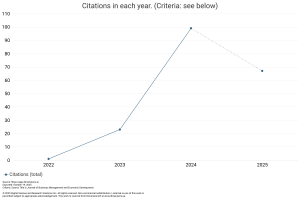Work Motivation Mediates Organizational Culture on Performance
DOI:
https://doi.org/10.59653/jbmed.v1i01.17Keywords:
Organizational Culture, Competence, Motivation, Employee performanceAbstract
The purpose of this study is to examine the variables of Organizational Culture and Competence that can have an impact on Employee Performance through the Motivation of the Library and Archives Office of East Java Province. Researchers here apply quantitative research and descriptive methods as research methods, and data collection techniques using observation, interviews, and questionnaires which are disseminated to respondents via the Google form. The population of this study uses the East Java Library and Archive Service Employees. The research sample used non-probability sampling from a purposive sampling approach of 54 employees. This study analyzes using PLS. The results of the study prove that Organizational Culture influences employee performance, Competence does not affect Employee Performance, Culture has an impact on Motivation, Competence has an impact on Motivation, Motivation has an impact on Employee Performance, Motivation can mediate Organizational Culture on Employee Performance, and Motivation cannot mediate Competency on Employee Performance at the Library and Archives Service of East Java Province.
Downloads
References
Autin, K. L., Herdt, M. E., Garcia, R. G., & Ezema, G. N. (2022). Basic Psychological Need Satisfaction, Autonomous Motivation, and Meaningful Work: A Self-Determination Theory Perspective. Journal of Career Assessment, 30(1). https://doi.org/10.1177/10690727211018647
Desselle, S. P., Zgarrick, D. P., & Ramachandran, S. (2022). Variability in perceptions of organizational culture across U.S. colleges and schools of pharmacy. Research in Social and Administrative Pharmacy, 18(4). https://doi.org/10.1016/j.sapharm.2021.04.025
Dinh Van Thang, & Nguyen Quoc Nghi. (2022). The effect of work motivation on employee performance: the case at OTUKSA Japan company. World Journal of Advanced Research and Reviews, 13(1). https://doi.org/10.30574/wjarr.2022.13.1.0047
Dos Santos, N. R., Mónico, L., Pais, L., Gagné, M., Forest, J., Cabral, P. M. F., & Ferraro, T. (2022). The multidimensional work motivation scale: psychometric studies in Portugal and Brazil. Management Research, 20(2). https://doi.org/10.1108/MRJIAM-07-2021-1206
Grover, V., Tseng, S. L., & Pu, W. (2022). A theoretical perspective on organizational culture and digitalization. Information and Management, 59(4). https://doi.org/10.1016/j.im.2022.103639
Hong, J., Guo, P., Chen, M., & Li, Y. (2022). The adoption of sustainable supply chain management and the role of organisational culture: a Chinese perspective. International Journal of Logistics Research and Applications, 25(1). https://doi.org/10.1080/13675567.2020.1795094
Idris, M., Maryadi, Saripuddin, D., Ahmad, F., & Muhammad, H. (2022). The Effect Of Transformational Leadership Style, Organizational Culture And Work Motivation Toward Employee Performance (Study On Developer Companies In Makassar). Academy of Strategic Management Journal, 21(1).
Lohela-Karlsson, M., Jensen, I., & Björklund, C. (2022). Do Attitudes towards Work or Work Motivation Affect Productivity Loss among Academic Employees? International Journal of Environmental Research and Public Health, 19(2). https://doi.org/10.3390/ijerph19020934
Makumbe, W. (2022). The impact of organizational culture on employee creativity amongst Zimbabwean academics. African Journal of Science, Technology, Innovation and Development, 14(2). https://doi.org/10.1080/20421338.2020.1864882
Megawati, M., Hamdat, A., & Aida, N. (2022). Examining Linkage Leadership Style, Employee Commitment, Work Motivation, Work Climate on Satisfaction and Performance. Golden Ratio of Human Resource Management, 2(1). https://doi.org/10.52970/grhrm.v2i1.86
Nasution, M. I., & Priangkatara, N. (2022). Work Discipline and Work Motivation on Employee Performance. International Journal of Economics, Social Science, Entrepreneurship and Technology (IJESET), 1(1). https://doi.org/10.55983/ijeset.v1i1.27
Naveed, R. T., Alhaidan, H., Halbusi, H. Al, & Al-Swidi, A. K. (2022). Do organizations really evolve? The critical link between organizational culture and organizational innovation toward organizational effectiveness: Pivotal role of organizational resistance. Journal of Innovation and Knowledge, 7(2). https://doi.org/10.1016/j.jik.2022.100178
Pham, T.-V., Huang, Y.-F., & Do, M.-H. (2022). The Effect of Critical Work Factors on Job Motivation and Satisfaction : An Empirical Study from Vietnam. Journal of Asian Finance, Economics and Business, 9(1). https://doi.org/10.13106/jafeb.2022.vol9.no1.0399
Prastiwi, I. E., Pardanawati, S. L., & Kurniawan, D. (2022). Employee Performance: Work Ability and Work Motivation. International Journal of Economics, Business and Accounting Research (IJEBAR), 6(1). https://doi.org/10.29040/ijebar.v6i1.3122
Rimbayana, T. A. K., Erari, A., & Aisyah, S. (2022). The Influence of Competence, Cooperation and Organizational Climate on Employee Performance With Work Motivation as a Mediation Variable (Study on the Food and Agriculture Office Clump of Merauke Regency). Technium Social Sciences Journal, 27. https://doi.org/10.47577/tssj.v27i1.5200
Sahoo, S. (2022). Lean practices and operational performance: the role of organizational culture. International Journal of Quality and Reliability Management, 39(2). https://doi.org/10.1108/IJQRM-03-2020-0067
Salwender, M., Schoel, C., Bless, H., & Stahlberg, D. (2023). The Politics Hurdle: Joint Effect of Organizational Culture and Gender on Lack of Fit Experiences. Social Psychological and Personality Science, 14(1). https://doi.org/10.1177/19485506221075898
Setyowati, W., & Sofingi, A. (2022). Determinants of Employee Performance with Work Motivation as an Intervening Variable at the Semarang City Search and Rescue Office. APTISI Transactions on Management (ATM), 6(1). https://doi.org/10.33050/atm.v6i1.1638
Shin, J., Moon, N. A., Caylor, J., Converse, P. D., Park, O., & Yeo, K. (2022). Economic Individualism and Job Engagement: Examining the Roles of Work Motivation and Growth Need Strength. Sustainability (Switzerland), 14(2). https://doi.org/10.3390/su14020591
Wallin, S., Fjellman-Wiklund, A., & Fagerström, L. (2022). Work motivation and occupational self-efficacy belief to continue working among ageing home care nurses: a mixed methods study. BMC Nursing, 21(1). https://doi.org/10.1186/s12912-021-00780-3
Xie, Z. (2022). Work motivation and organisational commitment among inclusive education teachers in China: the mediating role of job crafting. International Journal of Developmental Disabilities. https://doi.org/10.1080/20473869.2022.2042157
YAMAWATI, N. K. S., & DEWI, I. G. A. R. P. (2022). The Performance Of Employees Of Banks With Work Motivation as Moderator. International Journal of Environmental, Sustainability, and Social Science, 2(3). https://doi.org/10.38142/ijesss.v2i3.118
Zeng, D., Takada, N., Hara, Y., Sugiyama, S., Ito, Y., Nihei, Y., & Asakura, K. (2022). Impact of Intrinsic and Extrinsic Motivation on Work Engagement: A Cross-Sectional Study of Nurses Working in Long-Term Care Facilities. International Journal of Environmental Research and Public Health, 19(3). https://doi.org/10.3390/ijerph19031284
Downloads
Published
How to Cite
Issue
Section
License
Copyright (c) 2023 Lisa Natalia

This work is licensed under a Creative Commons Attribution-ShareAlike 4.0 International License.
Authors who publish with this journal agree to the following terms:
- Authors retain copyright and grant the journal right of first publication with the work simultaneously licensed under a Creative Commons Attribution-ShareAlike that allows others to share the work with an acknowledgement of the work's authorship and initial publication in this journal.
- Authors are able to enter into separate, additional contractual arrangements for the non-exclusive distribution of the journal's published version of the work (e.g., post it to an institutional repository or publish it in a book), with an acknowledgement of its initial publication in this journal.
- Authors are permitted and encouraged to post their work online (e.g., in institutional repositories or on their website) prior to and during the submission process, as it can lead to productive exchanges, as well as earlier and greater citation of published work (See The Effect of Open Access).





























